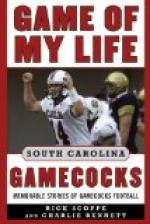Mrs. Clarkson said, “Thomas, please don’t lock up Isom; he won’t run away again. You won’t, will you Isom?” “No, mamma massie Henie, I won’t,” said Isom. “Yes, Henie,” said Mr. Clarkson, “he says so, but will he not?” “Thomas,” said Mrs. Clarkson, “I will take the responsibility if you do as I ask you to; I will keep Isom around the house and will assure you that he will not run away.”
Mr. Clarkson wanted to lock Isom up very much, but he knew what a strong will his wife had, and how hard it would be to get her right when she had got wrong, hence he complied with her request. So Isom worked around the house for a long time. The hunter was to rest a few days, and then resume his work, but Mr. Clarkson wrote to him that his services would be no longer needed, as the runaway slave whom he was employed to hunt had returned himself. I never learned whether the hunter got paid for what he had done.
MR. BLACK, THE SLAVE HUNTER.
There was a white man in Richland County, South Carolina, named Mr. Black, who made his living by hunting runaway slaves. I knew him as well as I did one of my fellow negroes on Col. Singleton’s plantation. He was of dark complexion, short stature, spare built, with long, jet black, coarse hair. He bore the description of what some would call a good man, but he was quite the reverse; he was one of the most heartless men I have ever seen.
Mr. Black was a very successful hunter, although sometimes all of his bloodhounds were killed by runaway slaves, and he barely escaped with his life. He used to ride a small bay mare in hunting, which was the only horse he owned. She was a thin, raw-boned creature and looked as though she could hardly walk, but knew the business about as well as her master; and in such troubles as above stated she used to carry him pretty fast out of danger. Mr. Black caught several runaway slaves belonging to Col. Singleton.
I have known him to chase runaway slaves out of the forest right through the colonel’s plantation, through a crowd of other negroes, and his dogs would never mistake any among the crowd for the ones they were after. When these hound dogs chased the runaways through farms in that way, many of them were killed and buried in the cotton or corn field by some among the crowd of negroes through which they passed. In general the slaves hated bloodhounds, and would kill them any time they got a chance, but especially on such occasions as above stated, to keep them from capturing runaways.
Once eight slaves ran away from Col. Singleton’s plantation, and Mr. Black, with twenty-five hound dogs, was hired to hunt them up. The dogs struck trail of the runaways late one afternoon, and chased them all that night, during which time they got scattered. Next morning three of the runaways were chased through a crowd of their fellow negroes, who were working in the cotton field. While chasing the runaways some among the crowd killed six of the dogs, including the two leading ones, and buried them in the cotton beds or rows, as we used to call them.




